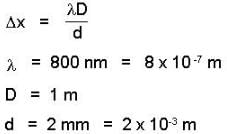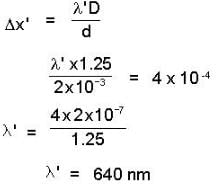Physics Exam > Physics Questions > In an experiment on young’s double - sl...
Start Learning for Free
In an experiment on young’s double - slit with the light of wavelength 800 nm, the screen is placed at a distance of 1 m from the slits having separation of 2mm. Now the screen is moved away farther 0.25 m. What should be the new wavelength of light so that the fringe - width remains the same (in nm)?
Correct answer is '640'. Can you explain this answer?
| FREE This question is part of | Download PDF Attempt this Test |
Verified Answer
In an experiment on young’s double - slit with the light of wave...

Fringe width

Now the screen is moved away further by 0.25 m
D = 1.25 m
d = 2 x 10-3 m

Most Upvoted Answer
In an experiment on young’s double - slit with the light of wave...
Children's behavior, researchers observed that when children were praised for their effort in completing a task, they were more likely to persevere and try harder on subsequent tasks. On the other hand, when children were praised for their intelligence or talent, they were more likely to give up easily and not put in much effort on subsequent tasks.
This phenomenon is known as the "effort praise effect" and has been widely studied in the field of psychology. It suggests that praising children for their effort and hard work, rather than their innate abilities, can have a positive impact on their motivation and performance.
The researchers believe that praising effort sends the message that success is a result of hard work and perseverance, rather than simply being talented or intelligent. This mindset encourages children to view challenges and failures as opportunities for growth and improvement, rather than as signs of their inherent abilities.
In contrast, praising children for their intelligence or talent can create a fixed mindset, where they believe that their abilities are fixed and cannot be changed. This can lead to a fear of failure and a reluctance to take on challenging tasks, as they may fear that their abilities will be exposed and judged.
Overall, the research suggests that praising children for their effort can have a significant impact on their motivation, resilience, and willingness to take on challenges. Encouraging a growth mindset by emphasizing the importance of effort and perseverance can help children develop a positive attitude towards learning and ultimately achieve their full potential.
This phenomenon is known as the "effort praise effect" and has been widely studied in the field of psychology. It suggests that praising children for their effort and hard work, rather than their innate abilities, can have a positive impact on their motivation and performance.
The researchers believe that praising effort sends the message that success is a result of hard work and perseverance, rather than simply being talented or intelligent. This mindset encourages children to view challenges and failures as opportunities for growth and improvement, rather than as signs of their inherent abilities.
In contrast, praising children for their intelligence or talent can create a fixed mindset, where they believe that their abilities are fixed and cannot be changed. This can lead to a fear of failure and a reluctance to take on challenging tasks, as they may fear that their abilities will be exposed and judged.
Overall, the research suggests that praising children for their effort can have a significant impact on their motivation, resilience, and willingness to take on challenges. Encouraging a growth mindset by emphasizing the importance of effort and perseverance can help children develop a positive attitude towards learning and ultimately achieve their full potential.

|
Explore Courses for Physics exam
|

|
In an experiment on young’s double - slit with the light of wavelength 800 nm, the screen is placed at a distance of 1 m from the slits having separation of 2mm. Now the screen is moved away farther 0.25 m. What should be the new wavelength of light so that the fringe - width remains the same (in nm)?Correct answer is '640'. Can you explain this answer?
Question Description
In an experiment on young’s double - slit with the light of wavelength 800 nm, the screen is placed at a distance of 1 m from the slits having separation of 2mm. Now the screen is moved away farther 0.25 m. What should be the new wavelength of light so that the fringe - width remains the same (in nm)?Correct answer is '640'. Can you explain this answer? for Physics 2024 is part of Physics preparation. The Question and answers have been prepared according to the Physics exam syllabus. Information about In an experiment on young’s double - slit with the light of wavelength 800 nm, the screen is placed at a distance of 1 m from the slits having separation of 2mm. Now the screen is moved away farther 0.25 m. What should be the new wavelength of light so that the fringe - width remains the same (in nm)?Correct answer is '640'. Can you explain this answer? covers all topics & solutions for Physics 2024 Exam. Find important definitions, questions, meanings, examples, exercises and tests below for In an experiment on young’s double - slit with the light of wavelength 800 nm, the screen is placed at a distance of 1 m from the slits having separation of 2mm. Now the screen is moved away farther 0.25 m. What should be the new wavelength of light so that the fringe - width remains the same (in nm)?Correct answer is '640'. Can you explain this answer?.
In an experiment on young’s double - slit with the light of wavelength 800 nm, the screen is placed at a distance of 1 m from the slits having separation of 2mm. Now the screen is moved away farther 0.25 m. What should be the new wavelength of light so that the fringe - width remains the same (in nm)?Correct answer is '640'. Can you explain this answer? for Physics 2024 is part of Physics preparation. The Question and answers have been prepared according to the Physics exam syllabus. Information about In an experiment on young’s double - slit with the light of wavelength 800 nm, the screen is placed at a distance of 1 m from the slits having separation of 2mm. Now the screen is moved away farther 0.25 m. What should be the new wavelength of light so that the fringe - width remains the same (in nm)?Correct answer is '640'. Can you explain this answer? covers all topics & solutions for Physics 2024 Exam. Find important definitions, questions, meanings, examples, exercises and tests below for In an experiment on young’s double - slit with the light of wavelength 800 nm, the screen is placed at a distance of 1 m from the slits having separation of 2mm. Now the screen is moved away farther 0.25 m. What should be the new wavelength of light so that the fringe - width remains the same (in nm)?Correct answer is '640'. Can you explain this answer?.
Solutions for In an experiment on young’s double - slit with the light of wavelength 800 nm, the screen is placed at a distance of 1 m from the slits having separation of 2mm. Now the screen is moved away farther 0.25 m. What should be the new wavelength of light so that the fringe - width remains the same (in nm)?Correct answer is '640'. Can you explain this answer? in English & in Hindi are available as part of our courses for Physics.
Download more important topics, notes, lectures and mock test series for Physics Exam by signing up for free.
Here you can find the meaning of In an experiment on young’s double - slit with the light of wavelength 800 nm, the screen is placed at a distance of 1 m from the slits having separation of 2mm. Now the screen is moved away farther 0.25 m. What should be the new wavelength of light so that the fringe - width remains the same (in nm)?Correct answer is '640'. Can you explain this answer? defined & explained in the simplest way possible. Besides giving the explanation of
In an experiment on young’s double - slit with the light of wavelength 800 nm, the screen is placed at a distance of 1 m from the slits having separation of 2mm. Now the screen is moved away farther 0.25 m. What should be the new wavelength of light so that the fringe - width remains the same (in nm)?Correct answer is '640'. Can you explain this answer?, a detailed solution for In an experiment on young’s double - slit with the light of wavelength 800 nm, the screen is placed at a distance of 1 m from the slits having separation of 2mm. Now the screen is moved away farther 0.25 m. What should be the new wavelength of light so that the fringe - width remains the same (in nm)?Correct answer is '640'. Can you explain this answer? has been provided alongside types of In an experiment on young’s double - slit with the light of wavelength 800 nm, the screen is placed at a distance of 1 m from the slits having separation of 2mm. Now the screen is moved away farther 0.25 m. What should be the new wavelength of light so that the fringe - width remains the same (in nm)?Correct answer is '640'. Can you explain this answer? theory, EduRev gives you an
ample number of questions to practice In an experiment on young’s double - slit with the light of wavelength 800 nm, the screen is placed at a distance of 1 m from the slits having separation of 2mm. Now the screen is moved away farther 0.25 m. What should be the new wavelength of light so that the fringe - width remains the same (in nm)?Correct answer is '640'. Can you explain this answer? tests, examples and also practice Physics tests.

|
Explore Courses for Physics exam
|

|
Suggested Free Tests
Signup for Free!
Signup to see your scores go up within 7 days! Learn & Practice with 1000+ FREE Notes, Videos & Tests.
















